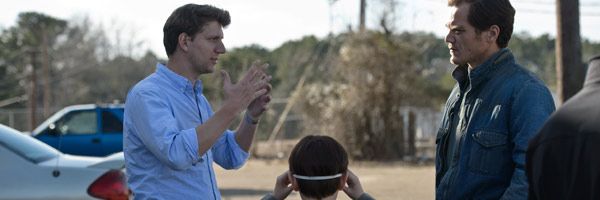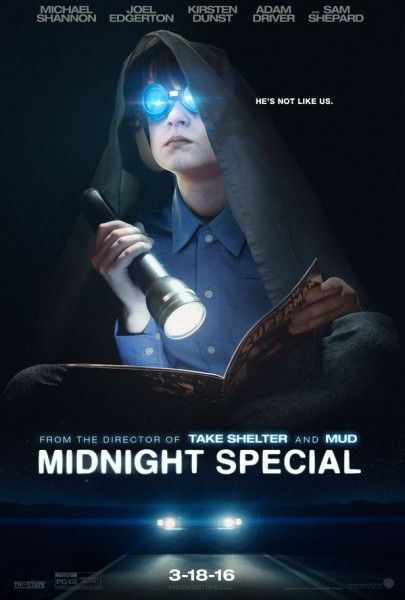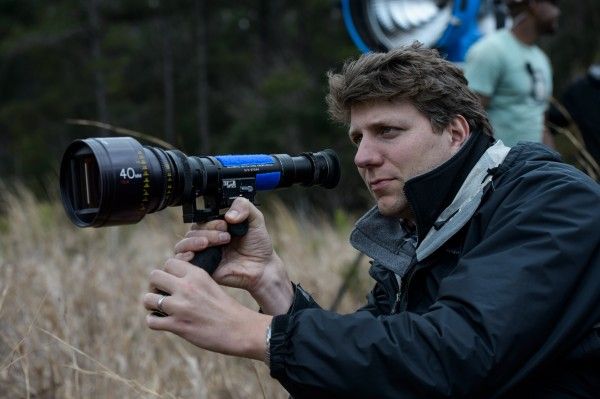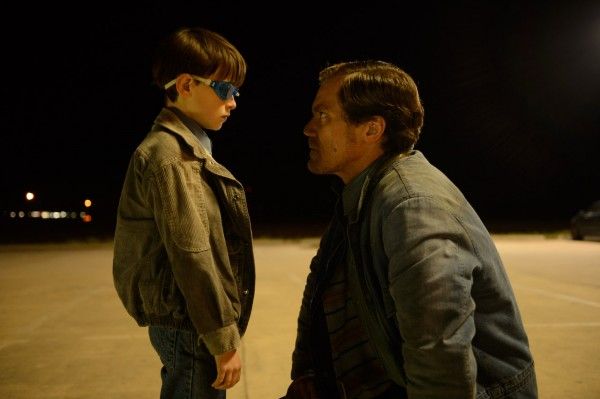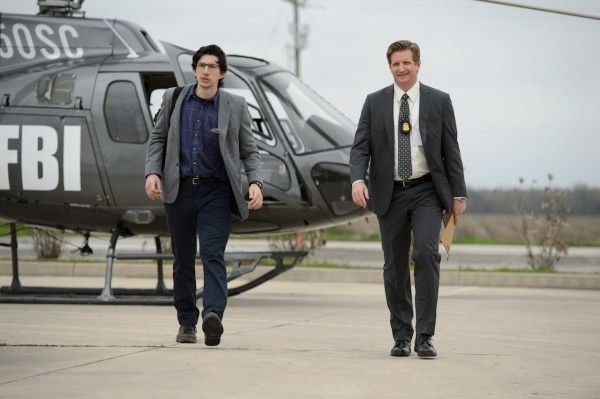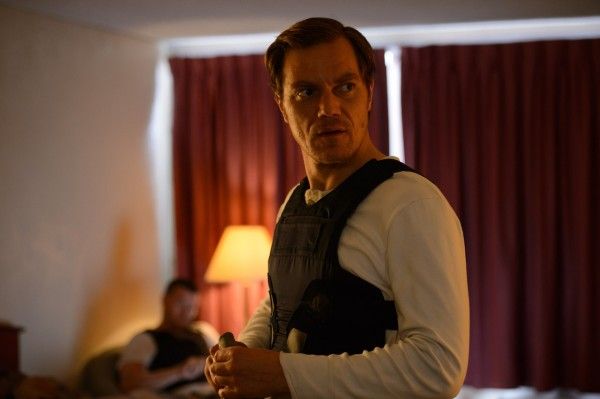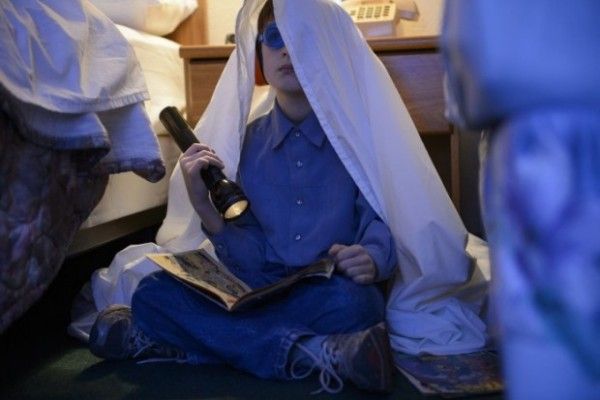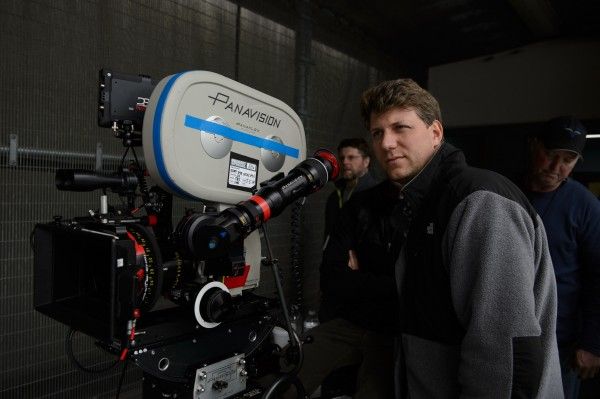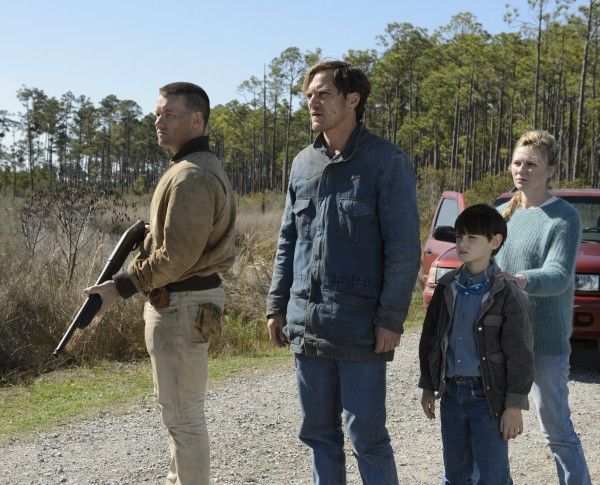Now playing in limited release is one of my favorite films of 2016: Jeff Nichols sci-fi drama Midnight Special. While the less you know the better, I’ll say that Michael Shannon stars as Roy, a father who goes to great lengths to protect his son (Jaeden Lieberher), a boy with special powers who is being hunted by the government and a religious cult. Joel Edgerton, Kirsten Dunst and Adam Driver round out the film’s impressive cast.
While many “Hollywood” movies love to explain every aspect of why something is happening, what’s refreshing about Nichols’ latest work is the way he tells you just enough but never reveals all the layers. He allows you as an audience member to decide on certain things for yourself. Trust me, Midnight Special is a really great movie and a story you haven’t seen before. Try and catch it in theaters.
I recently landed an exclusive interview with Jeff Nichols. He talked about the balance of selling your movie in trailer but also not giving away all the secrets, how his first cut compared to the finished film, deleted scenes not just in this but also in his previous films, his writing process, Michael Shannon, his next movie Loving, future projects, and more.
Collider: Although you’re going to have some naysayers, as you just said before we started, most people are loving the movie. Talk a little bit about the pressure of doing press when everyone likes the film.
JEFF NICHOLS: I don’t know. You know I’m a real-- as you’ll see in the next 15 minutes or however long they give you, I don’t know how to sell people on things. People ask me about past projects I’ve worked on, and other things; I’m just really bad at lying. I have a bad poker face, so I just try to tell people how I’m feeling in the moment and really what I was trying to do. I try to answer these questions-- I know this sounds strange-- as pragmatically and as honestly as I possibly can. And so I would be a complete liar if I said I haven’t been checking my Rotten Tomato rating in between interviews. Because it seems to keep going from like 90 to 84 to 87 to 86. So it’s not that I’m not a narcissist, it’s just I feel like people-- I don’t know they try to present these versions of themself, and it ends up making them look worse. I just try to tell people exactly where I was trying to come from.
Sure.
NICHOLS: And you know that the rest fall where it is. So I don’t know. I like people liking the movie and it makes me feel good.
I walked into this movie without having seen any trailers or TV spots or anything.
NICHOLS: Good.
Because I had heard, “Try not to hear anything about the movie and just go see it.” Obviously I am going to be in the minority, in terms of walking in not having seen anything.
NICHOLS: It’s a bummer.
So talk a little bit about the delicate balance of needing to market a movie, because movies cost a lot of money to make, while also trying to keep the mystery in the box.
NICHOLS: Well, you know I think it’s a couple things. And Warner Bros. has been really great about it. They sent me a couple trailers first, and they were really trying to explain what’s happening-- you know like the plot of the movie-- and I said, “Let’s not do that.” And we kind of had a list of things not to show, and that we’ve stuck to. And I said, “There are these other things you’re gonna have to show. You’re going to have to show the boys eyes. You’re probably going to have to show this moment at this gas station. But I think the best thing we can do is try and strip them of their context within the film itself, so that if you have to show an image of something, don’t attach it to what it’s actually attached to in the film. So try and break those things up. You can see one shot from one part of the film, but then put it with another shot from another part of the film.” And they actually kind of gave me, I think a little bit of confidence in terms of commenting on their marketing. I think Warner Bros. are probably some of the best people in marketing films in the world. I’ve really enjoyed watching how they’ve done it in the past, and I think, had I gone into this situation with them doing a wide release of this film, I would not have had the confidence to tell them how to cut a trailer. Right? Like who the hell am I, really? And when they said though that they were going to do a limited release, it was like, “Well okay, wait a second. You guys aren’t trying to talk to everybody. I don’t know how to sell a movie to so and so, but if you’re just going to these limited theaters, then we can be really, really smart about it. And we should. So let’s put a trailer out there that just gives the essence of what the movie feels like.
It feels honest to the film, hopefully, but it just kind of gives you a sense of the emotions that are at work and the tone that’s at work. Let’s just work on that and then you can throw some cool images together. The music’s great-- let’s just do that.” And it seemed to be they were pretty well on board with it. The problem is when you come to people like yourself, it’s your job to go and summarize the movie and tell people whether you like it or not. That’s what critics do. It’s up to the audience to decide how much of that they want to take in. And I’ve been really pleased to see a couple of the reviews actually start off with, “Stop reading now,” “I like it,” or “I don’t like it, but stop reading now if you want to go see it.” I appreciate that you know, but I don’t look to critics to be the ones to not do their job. It’s on the audience.
Fortunately, I don’t write reviews.
NICHOLS: (laughing) Oh good. Sorry, I didn’t mean to put you in that category.
No, it’s fine. People who work for me, or work for Collider, are the people who are going to review it. I just do interviews, which is fantastic.
NICHOLS: Awesome.
How long was your first cut versus the finished film?
NICHOLS: Uh, we took one big scene out. But then we added one small scene back in. So I think it’s always hovered around-- I don’t even know the end running time right now because it’s been so long.
I actually don’t know it either.
NICHOLS: It’s under two hours. I think picture to picture it’s probably around, I would say 108, 110. But that doesn’t count credits. Yeah it hasn’t really changed that much. I really structure the hell out of these things when I write them, and I’m really specific about what we shoot, so there’s not a lot of added stuff. And like I said, there was this one scene that I took out-- in hindsight it seemed so obvious, but it wasn’t so much on the front end. So yeah it’s stayed pretty well in line.
When you think about the previous films you’ve made, are there a lot of scenes still on the cutting room floor, or is it pretty much the way you made this is the way you’ve made your other films, where there’s not a lot there?
NICHOLS: It’s pretty much just like this, in fact. In the other films, there’s always been one scene that I take out. And it’s not just about length and pacing, although that’s usually where the conversation starts. It’s really about information delivery, and when people know something. For instance, there’s a scene in Take Shelter where Michael's character returns to this counselor that he’s been to see. In the film, he only sees her once. And there was this second great scene where he really talked a lot. Like he actually kind of laid out his world view. And it’s a beautiful scene. Mike did an amazing job. He’s still kind of pissed at me that it isn’t in the movie. But what I realized when we were in the editing room is that everything that he was saying, he was kind of describing where he was at in the movie and his world view, and we had already put those pieces together as an audience. And I think you were probably, as an audience, feeling really cool that you understood all these things. So to have to sit for three minutes, or four minutes, even though it’s a beautifully acted-- I would say pretty well-written (laughing)--scene, it felt like re-tread. It felt like we were covering territory that we already knew, and we were covering things that we figured out organically, through the process of watching the movie.
So why stop and tell us all that? Just to make sure we catch all those people who aren’t paying attention? Well, fuck those people who aren’t paying attention. And so, we’re going to keep going with the movie and make it faster and tighter and better. That also happened on Mud. There was a scene that I wrote after the girl breaks up with him in this high school parking lot. He goes home to his house and he builds a bonfire next to his house. And his dad comes out and starts burning his mother’s clothes in the yard. And it’s this really emotional scene. Had you told me at the script stage, “Take this scene out of the movie,” I would’ve said you were crazy. Like had a studio exec come in and said “You’re not going to need these mechanics because you’ve already got it in these other parts,” I would’ve told them they were crazy.
Talk a little bit about your writing process. I’ve spoken to a lot of people--writers--you know they wake up and can write two, three hours, maybe four, and then they’re tapped out. And then there are others it’s like a nine to five job. So for you, what is it?
NICHOLS: I think it’s important to say typing in the computer is like the last, last phase of my writing process. That’s kind of the fun part. Well, it’s all somewhat fun I suppose. But usually what happens is I think about a movie for at least a year--maybe a couple more--and I don’t put anything down. I’m just kind of collecting images, thoughts, collecting characters, collecting lines. And they’re all just kind of like a tape ball, growing over a period of time. And at some point there’s enough mass collected in this idea that it warrants coming out, and my schedule opens up, and it’s time to go into writer mode. And so I start putting all these things down on note cards because I heavily outline this stuff. For instance, for Midnight Special I’ll say ,“Okay I know this scene about the night vision goggles. I have a scene of this satellite. I’ve got all these other things,” and I start to throw them down on the ground. Less so for Midnight Special than the other films actually, but obviously a couple of them need to happen before others. So they start to take this form, but then there are all these free-floating scenes. And they’re just ideas. And you start to put those next to other ones. And that helps you kind of break up your linear mind. Like if you were to sit down to do an outline and say, “Point A, B, C--this is how we’re going to go through,” sometimes you know that you want to get down here but you don’t know how to connect the two. The note cards help to break the backbone of your linear thinking.
And I don’t think in terms of plot structure. I don’t really think in terms of plot lines. I do think in kind of like waves of the movie. So I start to then take all those note cards and I put them up on a giant cork board in my office. And before I start typing, I have a note card for every scene. And sometimes it will just be a description of a sequence. Sometimes it will be actual lines I’ve written on it. They can get pretty specific, and they can get pretty general too, depending on what happens in the scene. I can sit back and I can watch an outline of the whole movie on my wall. And you can sit there and just kind of close your eyes. You can see where it kind of slows down a little bit, and see where it’s going to speed up. You just watch the movie. And then I said about you know typing it out, and that’s why I think I reserve that part of the process for way later. Because when you start to type you fall in love with the words and the page like, “Oh look how cool it was, how I wrote this scene, and wrote this moment.” Well that doesn’t really matter. You can write a million moments a day and I think for a lot of writers, that’s how some guys write. You know I know guys that write 400 pages to get 100 good ones. I’m not like that. I outline and outline and outline and then I’m very specific about the stuff I write. That’s my process.
This is the biggest question I’m going to ask today. What blackmail material do you have on Michael Shannon that he’ll keep on coming back and working? Besides that you’re a good person and writer and director.
NICHOLS: I feel like he might have it on me. I’m just lucky to have him around you know. It’s a weird thing.
No, but seriously, what’s the blackmail?
NICHOLS: I got nothing you know. Mainly because he’s an open book. Mike genuinely doesn’t care about being famous. I think a lot of people like to pretend they don’t care about celebrity and they don’t care about the trappings of celebrity. Mike genuinely, I think, is in it for the work. It’s very rare, I mean watching him on press tours. He does not like doing press.
I have noticed. He’s still good at it.
NICHOLS: He’s good. He’s charming when he needs to be. He’s not a moron. He understands the efficacy of it. He doesn’t like just sitting around and talking. It’s like, “Why did I make the movie?” And he kind of gives you that attitude that he does not suffer fools. And I think if you apply that to the way we operate-- kind of like what I was telling you at the beginning-- I don’t try and convince him, or say, “Hey man I’m gonna make a great movie or do this for you, or this for your career.” It’s kind of like, “Look man I don’t know if this is going to help you, or hurt you, but this is what I’m trying to talk about. I’m trying to talk about the way I feel as a storyteller, and if there’s something in there for you, I wrote this part for you, so please show up and do it.” We’re just really pragmatic about things and we’re really pragmatic about things on set too. You know it’s not like, “Tell me was I beat as a child as this character.” You know we don’t spend time talking about that. You’re like, “You gotta get from here to here and here’s how I’m covering the scene. This is what I want to see. This is what I think’s important in it. This is the moment I think’s really going to get people in this scene. And this is where I think the camera’s going to be when I do that.” It’s like, “Okay Nichols.” And then he does it.
He told me that he shot for, I believe he said one day but maybe it was two days, on Loving.
NICHOLS: Yeah, one
Yeah I think that’s what he said. So was it one of these things where you were like, “I need you to be in this?” Or was it like, “I want to play this character?”
NICHOLS: No, you know I sent him all my scripts. “All” like I’m prolific (joking). But anytime I finish a script I send it to him. That’s what happened with Take Shelter. And he always texts me. He doesn’t call. But he texted me and he was like, “This is fucking brilliant.” He said the same thing with Mud. We actually had a phone conversation after Mud. Midnight Special, he texted, “I love it.” With Loving I sent it to him and he said, he just texted back, “Instant classic.” And we hadn’t really talked about what role he was going to play or anything like that. It was just, I think maybe a lot of people when they brought that project to me thought I would write the lead role for him. Because it’s a sort of quiet, emotionally closed off, brooding Southern guy. But I didn’t see him as Richard Loving. But when I found these photos of this Life photographer, he was a tall guy--like six foot four-- and he kind of looked like Mike. And as you’ll see when you see the film, he’s kind of gregarious. And I’d seen Mike in this one man play called Mistakes Were Made, which was amazing. And he was kind of gregarious in this play, and it’s a side of him that not a lot of people have seen. Because as this photographer, he enters people’s lives and very quickly has to ingratiate himself to them. Like he becomes their friend, so that he can take these really delicate photos. And I wanted to see Mike do that. So I just asked him if he’d do that, and then he said he would. And then of course he starts dealing with his schedule and all the movies that he’s doing and we worked it out. We didn’t need him more than the one day. We didn’t have to collapse anything especially to do that. That’s just how he shows up in the film. And luckily he was like, “Yeah that sounds good. I would love to do it.”
Last thing. I don’t know when Loving is coming out. When am I going to start seeing some marketing on that/when am I going to see it?
NICHOLS: They picked a release date for November 4th in limited. Focus just released that actually.
So it could be at the Toronto Film Festival?
NICHOLS: It could be. Yeah we haven’t started that process yet. I actually haven’t called picture lock on it just yet
Well it’s very early, though. It’s still only the beginning of the year.
NICHOLS: Yeah, I don’t know man. The last thing I want to tell you is that I’m going to get into a film festival and they don’t accept it. (laughs)
Sure, I understand.
NICHOLS: I’ll say this: it’s done enough to know I’m very, very proud of it. And I really want people to see it.
Are you writing something else now?
NICHOLS: This is the first time in my life since my first film Shotgun Stories that I don’t know what’s next. And I’m really liking it. Mark Twain always talked about a creative well that gets drained and has to refill. I need to refill the well.

